No Nichols
Free Tom and Free Palestine
If you’re here for a good time not a long time here’s a one minute version of all these NN posts.
I concede defeat to Tom Nichols. I fought the Tom and the Tom won. These days Israel is trying to beat genocide charges in the Hague for its actions in Gaza. Yemen is trying to stop those actions in Gaza by stopping shipping in the Red Sea. To stop Yemen from stopping Israel the US and UK began bombing Yemen. So things are moving forward, and I will too. But below are some pieces of the intended capstone to the No Nichols project. Enjoy.
Pictured above is Dr. Tom Nichols. Tom is an emeritus professor of international relations, author of seven books, Jeopardy champ, lover of cats, hater of Trump, and writer for The Atlantic. He’s a pretty impressive guy.
But there’s no inference to infallibility from even achievements as impressive as Tom’s. He still might make mistakes. And in his efforts to support the state of Israel I think he does.
Tom’s recent1 Atlantic article on The Juvenile Viciousness of Campus Anti-Semitism shares a certain logically shaky structure with many of his tweets and skeets involving Israel.2 Their primary focus is on faults of Tom’s liberal or leftist political rivals who are sympathetic to the people of Gaza and critical of the Israeli state’s actions there. But this focus is not exclusive. Alongside it, and seemingly supported by it, are overall judgments against the people of Gaza and in favor of the state of Israel.
According to Tom, pro-Palestinian Americans are misusing the word “genocide.” They are chanting a slogan associated with murdering Israelis. They are taking the same side Hamas terrorists take. They are opposing the side more Jewish people take. All this is ugly, shameful, poisonous, and antisemitic. It must be rejected and Israel must be supported.
That sounds and feels fairly coherent. But there are two big problems. The first problem is that logically speaking Tom’s criticisms of supporters of the Palestinians do absolutely nothing to show us how to think about Palestinians themselves, or their Israeli opponents, or the conflict between them.3 The second problem is that the criticisms themselves have serious confusions. Take this example:
This feels like it serves Tom’s overall support for Israel does it not? We get the sense that those going against Israel and shouting about genocide are dumb and wrong. Their position relies almost exclusively on just one professor! And he’s just telling them what they want to hear! If these critics of Israel are so stupid and wrong then surely supporters of Israel must be smart and right. So Israel itself must be right. And Palestinians themselves must be wrong.
This line of thinking gives the pro-Israel position psychological support—but absolutely no logical support. As the social and moral and tribal animal that we are we know deep in our gut that there’s our team and the opposing team, us and them, friend and enemy, the in-group and the out-group, the good guys and the bad guys. So any attack on someone supporting Palestinians will tend to feel like some sign of goodness and rightness in Israel, and its conduct in Gaza, and its supporters in America. But logically this just does not follow. The relations of certain Americans to a certain word and a certain professor cannot support conclusions about big moral and political realities of Israelis and Palestinians half a world away.4 To reach any serious sensible judgments about those things we’ll need to actually examine them. If we want to think clearly about them we’ll need to actually think about them.
Now notice Tom’s second big problem. Even once we set aside all efforts to judge Israelis and Palestinians themselves using Tom’s criticisms of Americans, still many of those criticisms are themselves false or confused. In this case what Tom’s skeet says about genocide and a New Jersey professor seems to be either deeply confused—or meant to confuse you.
Tom speaks of folks who take an “‘it’s genocide!’ position.” This can be heard in different ways. Does it mean everyone who is supporting Palestinians and opposing how Israel keeps killing so many of them? Does it mean only the subset of those folks who are using the word “genocide”? Does it mean only the smaller subset using the word “genocide” a whole lot and pushing others to use it too?
Meanings like these give the skeet all its force. It seems like it hits all supporters of Palestinians, or at least a whole lot of them. But in fact it doesn’t. In fact it applies only to narrow nerdy discussions of international law and word usage—only a small number of the conversations of a small number of the supporters of Palestinians. It applies only to a legal question most people aren’t focused on, after assuming a view of language most people don’t hold.5 If someone claims that the word “genocide” should only ever be used to refer to the UN’s legal definition of the crime of genocide,6 and also claims that present public evidence about events in Gaza could establish, in proceedings before the International Criminal Court, that these events meet this definition—then that person’s position on the second point would, in terms of publicly stated expert opinion, rely almost exclusively on one Israeli historian and genocide scholar named Raz Segal, who teaches at a medium sized university in New Jersey.
Is that how you took Tom’s words? I’m guessing it’s not. And yet it’s the only sense in which those words are true. Because all other forms of support for Palestinians, or opposition to how many of them Israel is killing, have little if any dependence on Professor Segal out in Jersey. This means Tom said something that when heard one way is impactful, and when heard a different way is true—but is never both at the same time. The true thing and the impactful thing exclude each other. So Tom and his fans can say something impactful, and can defend something true, but can only do both if they use some sort of shell game to shift between the true but narrow sense and the broad but false sense. This sort of deception is difficult to challenge. It uses confusion that’s easy to create but hard to correct.7
2
We see these same structures in The Juvenile Viciousness of Campus Anti-Semitism. Again Tom is focused on faults of pro-Palestinian Americans.8 And hitchhiking along again are judgments about Israelis and Palestinians that receive rhetorical support from Tom’s topic, to be sure, but are given no rational support.9 So Tom moves you to feel things he’s given you no reason to believe. Maybe he’s still right, and we can find evidence elsewhere. But we don’t find any here.
Again much of what’s most important is left unstated. In this article on antisemitism in protests Tom never says what antisemitism is or what is being protested. His closest approach to the latter is two mentions of “Israeli policy”—by which he means the total siege and merciless bombing of the Gaza internment camp that has now killed over 24,000 people including 9,600 children.10
Tom somehow sees this brutal collective punishment of 2.3 million people as morally good.11 Or even less plausibly as morally neutral or only a small evil. He doesn’t directly say this but must mean it because his whole message in this Atlantic article is an earnest moral warning to avoid these protests in order to avoid moral damage from their antisemitism. And this message can only make sense if Tom sees no comparable or greater moral damage in dodging the protests and ignoring or supporting what Israel is doing.12 The argument runs like this:
A) Antisemitism is an awful evil hatred.
B) It is a defining feature of these campus protests.
C) It will morally sicken and stain and rot you if you participate in the protests.
D) [implicit] No comparable moral sickness or stain or rot comes from supporting or ignoring what’s being protested.13
E) So stay the hell away from the protests.14
I emphatically agree with Tom that antisemitism is an awful and evil hatred. In my view it needs to be challenged, condemned, confronted, and sometimes physically fought. It needs to be rejected and combatted along with all racial and religious hatred, all cruelty and persecution and oppression. And we need to look hard at our own hearts, words, actions, allies, and organizations for the subtler signs of hate, bigotry, bias, and honestly anything less than pursuing full equality and solidarity with all fellow human beings. No group on earth and no person on earth deserves to be seen or treated as less than fully human. We need to oppose hatred toward Jews, hatred toward Muslims, hatred toward Christians, hatred toward Black people, hatred toward Asian people, hatred toward Arab people, hatred toward trans people, hatred toward gay people, hatred toward people who aren’t from your country or don’t share your culture or don’t match your complexion. I’m against all of it. All these people are people, and all these hatreds are hideous and poisonous and dangerous.
All of our miserable hatreds based on identity stand in the background when we talk about antisemitism. With antisemitism itself being hatred based on Jewish identity, centering variously on ideas of race, religion, culture, or conspiracy, and reaching from subtle attitudes or assumptions all the way to murderous actions. For Nazis the focus of antisemitism was racial, for medieval Christians it was religious, for Elon Musk it’s conspiratorial. From these different angles Jewish people have been marginalized and brutalized in a huge variety of ways, from legal housing segregation and job discrimination and property confiscation, to mob murder and robbery and property destruction, to coerced religious conversion, to expulsion from cities or countries, to massacres incited or organized by the church or the state, to scapegoating for military defeat or bubonic plague, to elaborate accusations about ruling the world or desecrating Christian communion or killing Christian children.
Worst of all was the Holocaust…15
…
This presents a puzzle. Tom and I strongly agree about antisemitism but strongly disagree about Gaza. For me both sets of views come from exactly the same place, namely seeing all people as people. How can Tom embrace one and reject the other? If Tom’s opposition to antisemitism comes from any similar place of seeing all people as people shouldn’t it lead him to see Palestinian people as people? But doing so seems hard to harmonize with his stance on Gaza…


Let’s now do what Tom and others so resolutely resist and consider events before October 7th. I outline the history in this companion post, but a shorter outline is this. Jewish history began over 3,000 years ago in or near what’s now Israel. Two temples and three rebellions against Rome later most Jews were expelled by 135 CE. While living elsewhere they remained a distinct ethnoreligious group and very often suffered for it. In the late 1800s, after long centuries of experience with European antisemitism, and as antisemitic riots and massacres kept worsening in the east, a movement called Zionism began among Jews in Europe with the goal of responding to all that suffering and antisemitism by creating a Jewish state or homeland. By 1905 they settled on their ancient stomping grounds of Palestine as the place to do it.
Major migration occurred under British rule, from 1917 to 1948, when Jews went from 6% of the population to 33%. In 1947 Arab Palestinians declined a UN proposal to give 56% of their land to these recent immigrants. So instead those immigrants took 78%. From 1947–49 they destroyed 500 Palestinian towns, killed 15,000 Palestinians, and forced over 700,000 from their land. During these events Britain pulled out, the state of Israel was declared, the US immediately recognized it, neighboring states invaded, and Israel won that war. Most of the Arab Palestinians forced from their homes in what was now Israel became refugees in Gaza, the West Bank, Jordan, Lebanon, or Syria. That’s why Gaza today is over 70% refugees. These are people forced from their homes, or whose parents or grandparents were forced from theirs, in Israel’s bloody founding just 75 years ago.
Arguments are made that 75 years is long enough to no longer count. Shit happens, conquest happens, history is rough, but some statute of limitations has run so that now we need to just let this one lie. Those arguments get harder in 1967, when Israel occupies Gaza, the West Bank, and East Jerusalem. That’s the 22% of the land that hadn’t become Israel, where many of the refugees forced from the other 78% had gone. So the state that took their homes and made them refugees on scraps of their land then comes and occupies those scraps too. Then those scraps start to shrink…
Palestinians see these soldiers help settlers come take piece after piece of what precious little land is left. That’s the West Bank and East Jerusalem, from 1967 all the way to 2024.16 And that’s Gaza, until occupation changes to incarceration. Since 2005 Israelis were not inside Gaza, but since 2007 Palestinians cannot leave Gaza…
…
For anyone willing to see the factual outlines, and see the Palestinians as people, I see no way to continue supporting what’s being done in Gaza by Israel’s military with America’s backing. There are four basic ways such support is attempted, of which Tom uses three:
Deny the sufferings—Reject the numbers, the stories, the photos, the videos. You can’t believe Hamas.
Deny the sufferers—Distance, devalue, dehumanize, demonize. Palestinians are very different from you and me. They are poor, foreign, Arab, Muslim. They are brutal. You saw what they did and cheered on the 7th. You saw all the people they burned and all the babies they beheaded. The 7th tells you all you need to know. They are bloodthirsty, barbarians, terrorists.
Just war—Israel is fighting a defensive war for its survival. It started October 7th when Hamas attacked, and continues because Hamas won’t surrender. Israel tries to minimize civilian suffering and death but can only do so much since Hamas uses human shields. Israel is only doing what’s necessary to defeat Hamas.
Just ignore—Learn and think and speak and write as little as possible about events in Gaza and what they mean for the 2.3 million human beings there. Accept the numbers but avoid the stories, the details, the photos, the faces.
To Tom’s credit I have not seen him deny any concrete facts. His main move is simply to ignore. Say nothing about Israel’s siege or American bombs or Palestinian children. In fact mention no Palestinians at all except Hamas terrorists. And mention no events but their October 7th attack…
Is this a war Hamas started? Yes and no…
…
Thank you for your interest friends and enemies and internet strangers.
Further Reading
Here is the whole No Nichols complex or constellation or conflagration:
These are the prior posts that offer the strongest support:
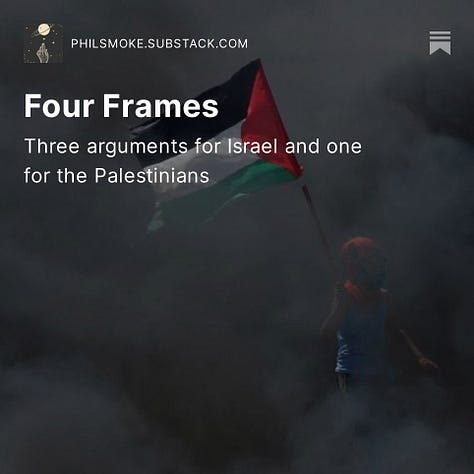
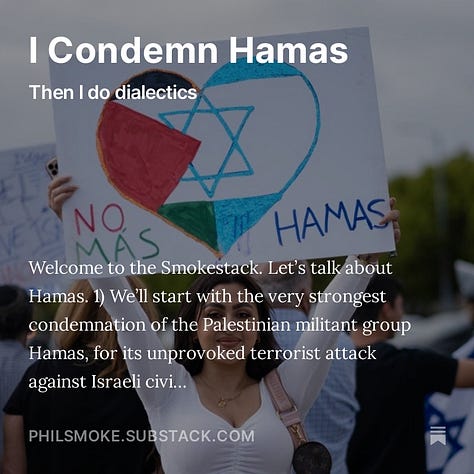
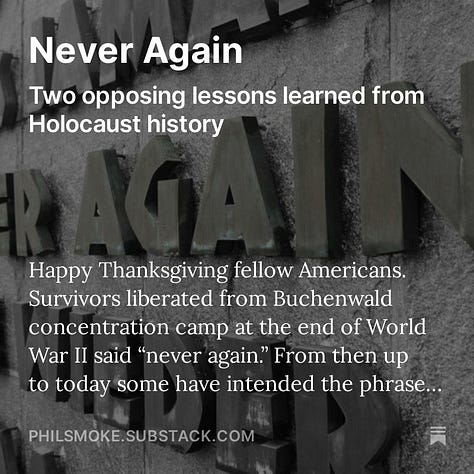


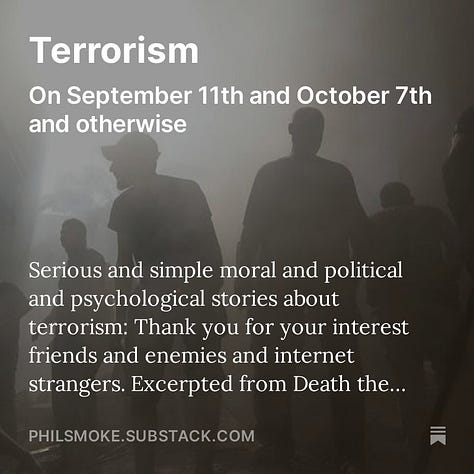

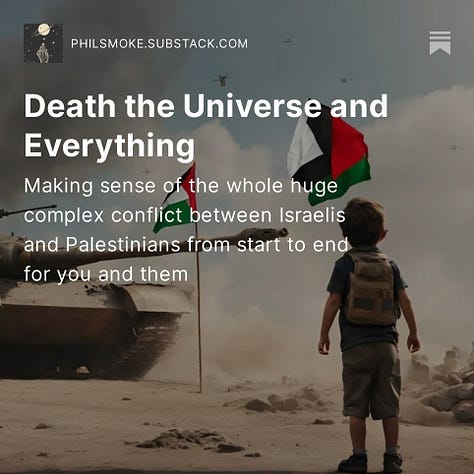

Footnotes
Recent, or at least relatively recent, i.e. November 13, 2023. This response hit some delays, and maybe some mission creep.
I can’t speak to the full contents of Tom’s heart or mind or oeuvre. So it’s possible that the points on which I challenge him are points on which he’s done additional careful thinking that he just hasn’t shared publicly, or that he has indeed shared and I just haven’t read. If my limited impressions of Tom’s thinking are mistaken I’m very ready to be corrected.
By my lights Tom’s criticisms of Americans do not need to tell us anything about Palestinians or Israelis or their conflict. Tom does not need to talk about Palestinians or Israelis at all. If he chooses to talk about them, and to convey some sorts of judgements or conclusions, he can support those in any way he likes. Or he can decline to offer any support, either because he lacks such support or because he’s just choosing not to offer it for any range of stylistic or intellectual or political reasons. None of those paths would come in for my present criticism. What I’m criticizing is the big picture of A) choosing to convey judgments or conclusions about Palestinians and Israelis and their conflict, B) doing so in the midst of attacks on American political competitors that offer psychological support but not logical support to those judgments or conclusions, C) declining to offer other support aside from the occasional mention of Hamas and their October 7th attack, D) generally presenting himself as something like a reflective rigorous rational thinker bringing truth and insight, and E) denigrating so many of those who disagree with him as something like irrational, ignorant, sloppy, lazy. It is the interplay of these elements that I think creates a holistic message and posture that is in the final analysis some real bullshit.
I’m not saying nothing at all can ever be inferred about a cause from all the people who support it and all the actions they take. But the valid inferences are substantially weaker and more complicated than the tribal emotional reactions we often embrace. For a look at the faulty tribal moves see NN: Terrorist Sympathizers. For more on the impossible logical moves see NN: Impossible Inference.
I’m not citing particular polling or social science or experimental philosophy but am myself making these claims about “most people.” The claims can be debated, but I think they stand up well. What I mean by the first claim is that most of the time most people are more concerned with some question along the lines of how good or bad Israel’s actions are than with the question of whether Israel’s actions could at present be demonstrated before the International Criminal Court to satisfy the elements of the formal crime of genocide as defined in the 1948 UN Genocide Convention. Any challenges? My second claim is that most people do not hold Tom’s pedantic and prescriptivist view along the lines that words have one definite meaning and all uses that depart from that one true meaning, however similar or sensible or common those uses might be, are best seen not as a different use of the word but as a stupid mistake. I am claiming that most people do not hold that view in the sense that they do not go around thinking and articulating and applying such a view, but not necessarily that they actively reject the view or affirm a competing view.
That’s Tom’s position, contrary to e.g. these ways of thinking; ways we use other words for other crimes, e.g. murder, kidnap, assault, fraud, slander; and many philosophical views concerning language, including these.
As discussed here it is much easier to make a mess than to clean one up.
You might object that I’m putting way too much stock in a single skeet. I’d reply that I’m not using the skeet to prove but to illustrate. Whether it’s a fair or unfair illustration, and whether the claims it illustrates are true or false, can only really be judged by looking at the rest of this essay and the rest of Tom’s writing regarding Israel.
Hopefully that clarifies things. But if you want to pursue it further we can:
(Correction: I overstated the dunking vs. conversing point. Some conversing occurs.)
It is no knock on Tom that he focuses on criticizing American supporters of Palestinians. As a writer and as a free autonomous human being Tom can focus on whatever he wants. He could think and talk and write all day long about problems in protests or about misuse of the word “genocide,” just as he could about gardening or garden gnomes or real gnomes. Problems arises only when Tom addresses whether to support or oppose what the state of Israel is doing in Gaza. It seems like Tom tries very hard to talk about that without talking about it. He tries to support Israel and the supporters of Israel, and condemn Palestinians and the supporters of Palestinians, and to do this from the moral and intellectual high ground—but without examining realities for Israelis and Palestinians apart from occasional references to Hamas and October 7th. I don’t think that works.
Tom might mistakenly see these judgments as being rationally supported by the criticisms of Americans that are his focus. Or he might see them as true judgments brought in from outside that neither get nor need rational support within the article. And that could certainly be the case. Although alternately the judgments could be mistaken. It’s not impossible.
Those are the numbers as of January 14th, 2024. Here’s one place for current numbers. These were the numbers when Tom’s article dropped on November 13th. These numbers are probably lower than the actual figures because they exclude thousands of people considered missing. Any information source is worth questioning, including the Gaza Health Ministry providing the numbers. Questions of this sort can be used solely for deflection and denial. But if you actually want to dig in check out #4 here.
Tom makes big moral claims in this piece. He gives dire warnings about the moral bottom line. He doesn’t just make moral evaluations of ideas like antisemitism or of particular events at protests or even of the protests on the whole. He attempts even bigger moral judgments and speaks to what readers should ultimately do in response to all morally relevant parts of our entire world.
You can’t coherently warn someone to avoid a particular harm of one course of action by means of some alternative course of action with even worse harm. You can’t tell someone to avoid a $10 toll by taking a different route with a $20 toll. In the same way Tom can’t be warning readers away from the moral stains of antisemitic protests and into an alternative course of action with even worse moral stains.
Tom could conceivably try to argue that moral damages differ across domains such that it is of paramount importance to stay away from antisemitism even in forms as attenuated as using a slogan tainted by it, but no similar care is needed with regard to moral damage deriving from e.g. Islamophobia, anti-Arab racism, or colonial dehumanizing, even when they are contributing to present concrete harms much greater than any presently coming from antisemitism. Or, Tom could urge readers to avoid the protests but pursue their goals in alternative ways. Since he makes no gestures in such directions, though, so I think it’s fair to say that his message is simply to avoid the protests and ignore or support what Israel is doing in Gaza. This reading is bolstered by our knowledge from outside the article that he himself does supports it.
This is implicit, whereas the other points listed above are explicit and emphatic. Tom does not directly state this point but his admonition to avoid the moral stain and rot and cancer of the protests can only make sense if no comparable or greater stain or rot or cancer is incurred through ignoring or supporting the thing being protested. Cf. the preceding footnote.
Tom says the protests are completely contaminated with antisemitism that can completely contaminate you. Students engaging in these hateful protests are “not only poisoning their campuses” but also “embracing a moral stain [...] they can never expunge.” They’ve been tempted into “a decadent waltz with an ancient and hideous hatred,” and many have sunk all the way to “moral destitution.” They “do not realize the damage they are doing to their community—and the moral tumor they are implanting into their developing character.” Even indirect adoption of this antisemitism is “a moral rot that today’s students will one day have to either recant or endure.” They “need to know that some actions will damage them forever.”
i) Tom’s four questionable cases, and whether A and B above point to different things using the same word:
Those Holocaust posts are here, here, here, and #6 here.
ii) Is violent resistance ever legitimate? Is sympathy ever exploited? Is the thought of replacing Israel’s government always antisemitic?
iii) Wait what are protesters protesting anyway? Point D above is unstated but absolutely asserted:
(Parts of these recordings reflect framings of parts of this post that evolved after recording)
The Holocaust is a giant nightmare I can’t comprehend made up of many smaller but still giant nightmares I can’t comprehend and ultimately it should inspire opposition to what Israel is doing in Gaza:
An application of some of this to genocide terminology:
Starting in 1994 as part of the Oslo Accords some circumscribed control over parts of Gaza and the West Bank passed from Israel to the Palestinian Authority.



